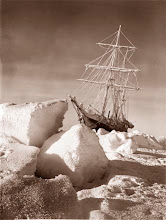The Soviets thought it would be a nifty spot for rocket launches. Hitler had claimed the land for the Fatherland by flying over the White Continent and dropping little metal swastikas. The whaling and seal hunting had folks from all over the world rubbing their palms in anxious anticipation of the booty that could be scored in Antarctica. Ditto the discovery of coal and gems under the ice. In 1952 the Argentinians chased off a British meteorological expedition (in some ways foreshadowing the Falklands War that would come three decades later).
But in the end, the world mostly agreed to place nice. And 50 years ago this week, the Antarctica Treaty established that the bottom of the world belonged to nobody and everybody.
Sort of.
Rather than divvy up Antarctica and its surrounding waters, the treaty put those claims aside. Instead, the pact protected the continent for wilderness and scientific study.
That's not stopped the British, French, Norwegians, Australians, New Zealanders, Argentinians and Chileans each from making pie wedge shaped claims -- sometimes problematically overlapping -- on ground that extends from the South Pole out to and beyond the Antarctic Circle. Chile has a monument at the very southern edge of South America that is supposed to mark its geographic center -- the implication that Santiago's territory stretches to the pole. In 1978, Argentina air-lifted a pregnant woman to an Antarctic science station to give birth. Her son, Emilio Marcos de Palma was the first known Antarctic-born citizen. Since he was also Argentinian, the boast was that the Antarctic place of his birth must also be Argentinian.
Still, ever since 12 countries including the United States signed the Antarctic Treaty in Washington in late 1959, the last-found continent has been left mostly to scientists. The standing claims of seven nations to various parts of Antarctica were not recognized in the treaty and have been dismissed everywhere but in the capitals from which they were issued. No military bases have taken hold (although countries often hold suspicions about how robust the science of its rivals appears, and whether those competitors are principally interested in a geographic toehold). (The American flag is hoisted here at Palmer Station only on those rare days when a ship comes in. It waves above the U.S. Antarctic Program flag and that of the country or the state from which the arriving ship hails.)
Some people are critical of the treaty, saying it's created a legal no-man's-land that makes it more difficult to put environmental protections in place, to secure plant and animal sanctuaries and assign responsibility for maritime rescue. That's partly because a unanimous vote is required by the signatories of the treaty to put any restrictions into action. Even then, enforcement invites an an international legal limbo.
Still, the treaty is generally lauded as a conditional success and environmentalists, for instance, typically fret over its demise.
The stakes could change. There remains belief that the continent could have great stores of natural resources. Even oil. And if the climate does become more temperate -- and more practical for mining and drilling -- the stakes could change. And with that, the dynamics of international cooperation might be tested as well.
Wednesday, December 2, 2009
Subscribe to:
Post Comments (Atom)






4 comments:
Sunset. What hath God wrought?
OK, I'm dense, but I can't figure out what the first photo is. It looks like a cross between a whale and Disney's version of the Nautilus submarine from "20,000 Leagues Under the Sea."
Also, the photo of the sunset -- or sunrise or sun circlement or whatever the sun does down there this time of the year -- is spectacular.
I'm enjoying your stuff so much I'm thinking The Star should establish a Palmer Station Bureau and leave you down there permanently. There's a lot to like about that idea.
The first photo is, quite literally, the south end of a humpback whale headed north.
Hey Cool Uncle-These pictures are amazing!! I'm so jealous you get to see all this in person (but then I think of the cold and I'm okay with just looking at pictures). :) Missed you at Thanksgiving! -Michele
Post a Comment